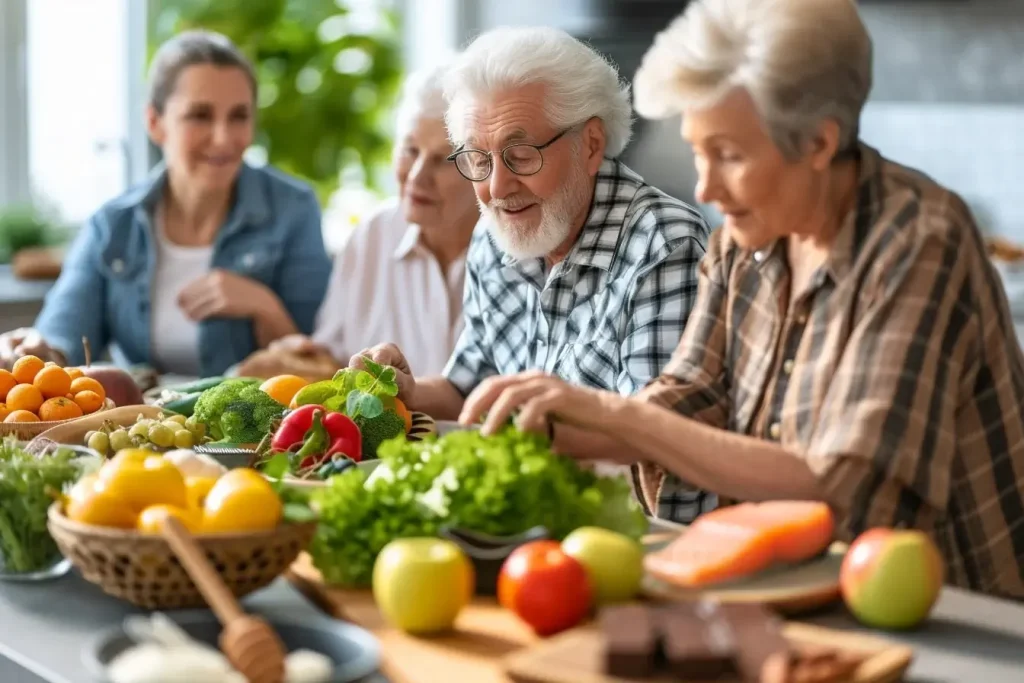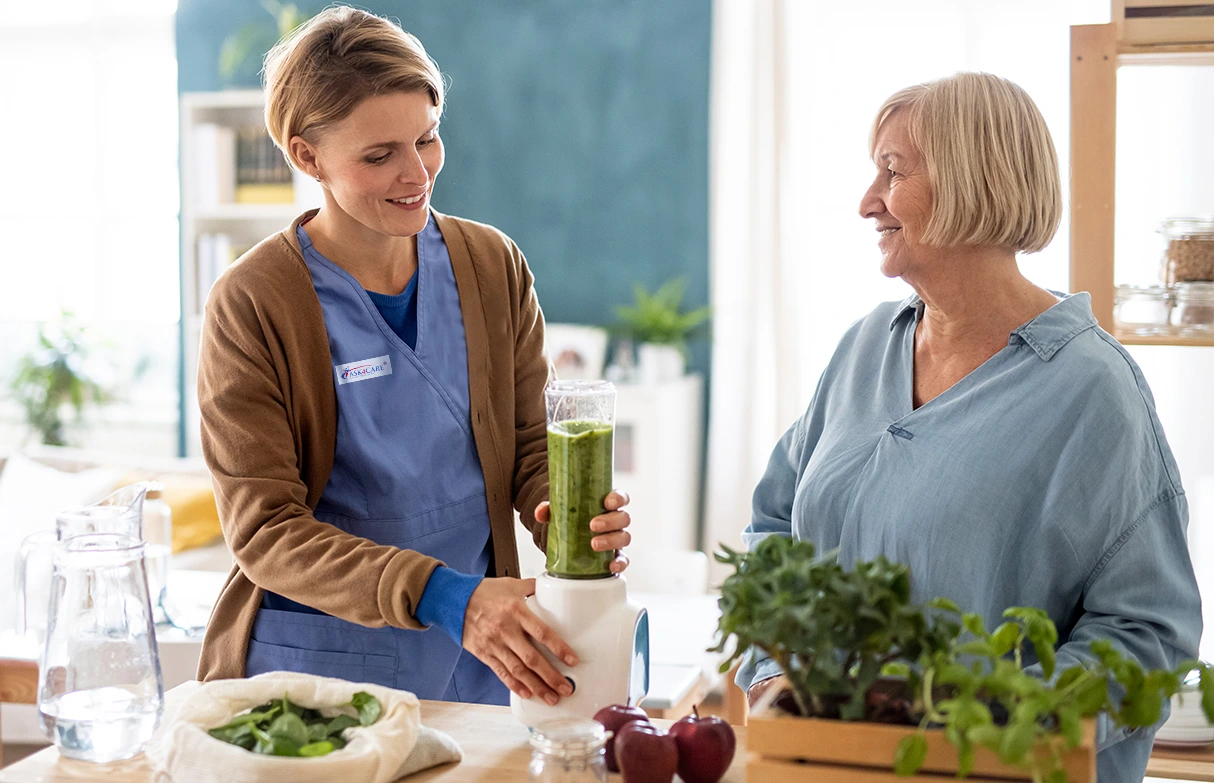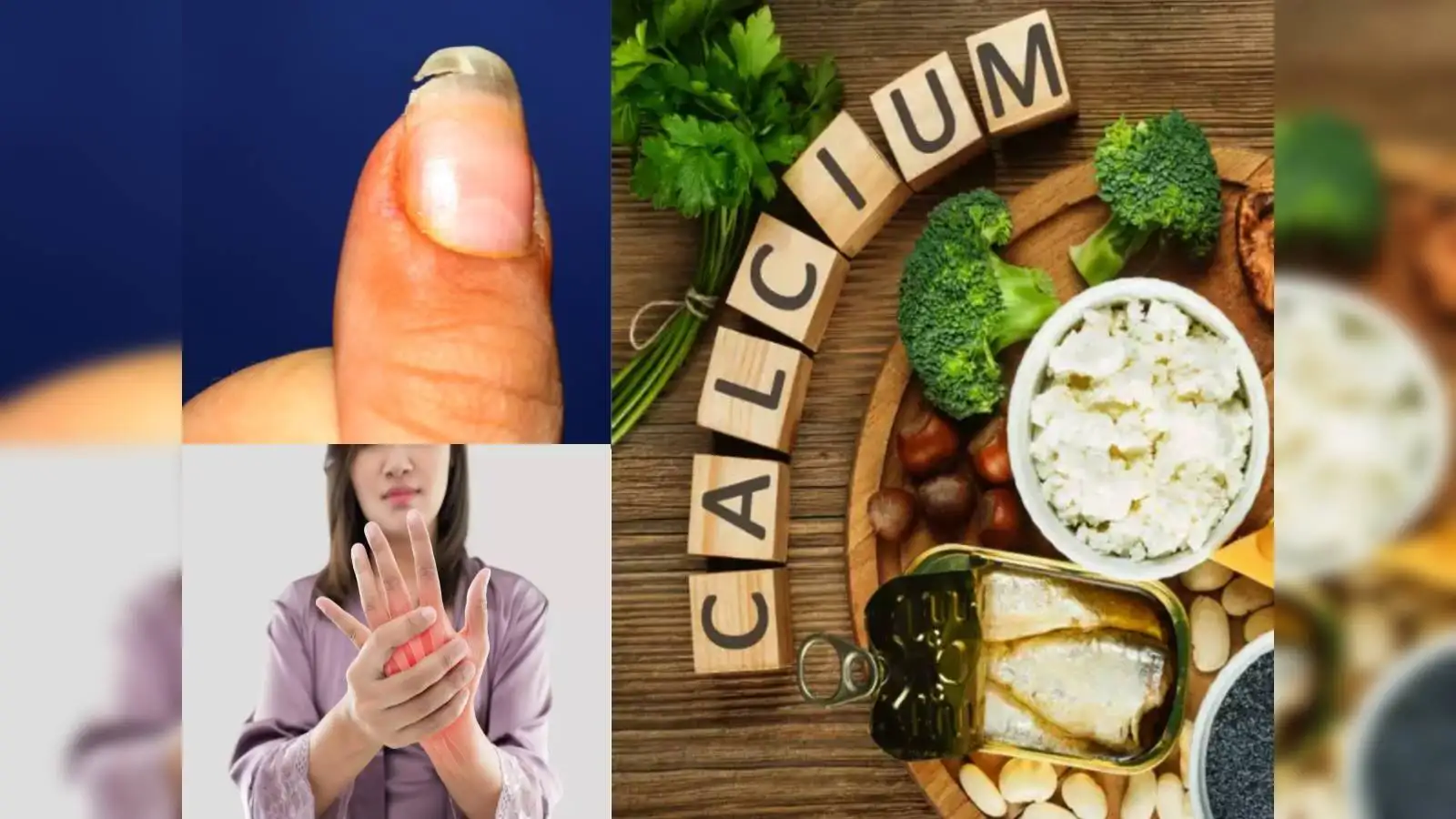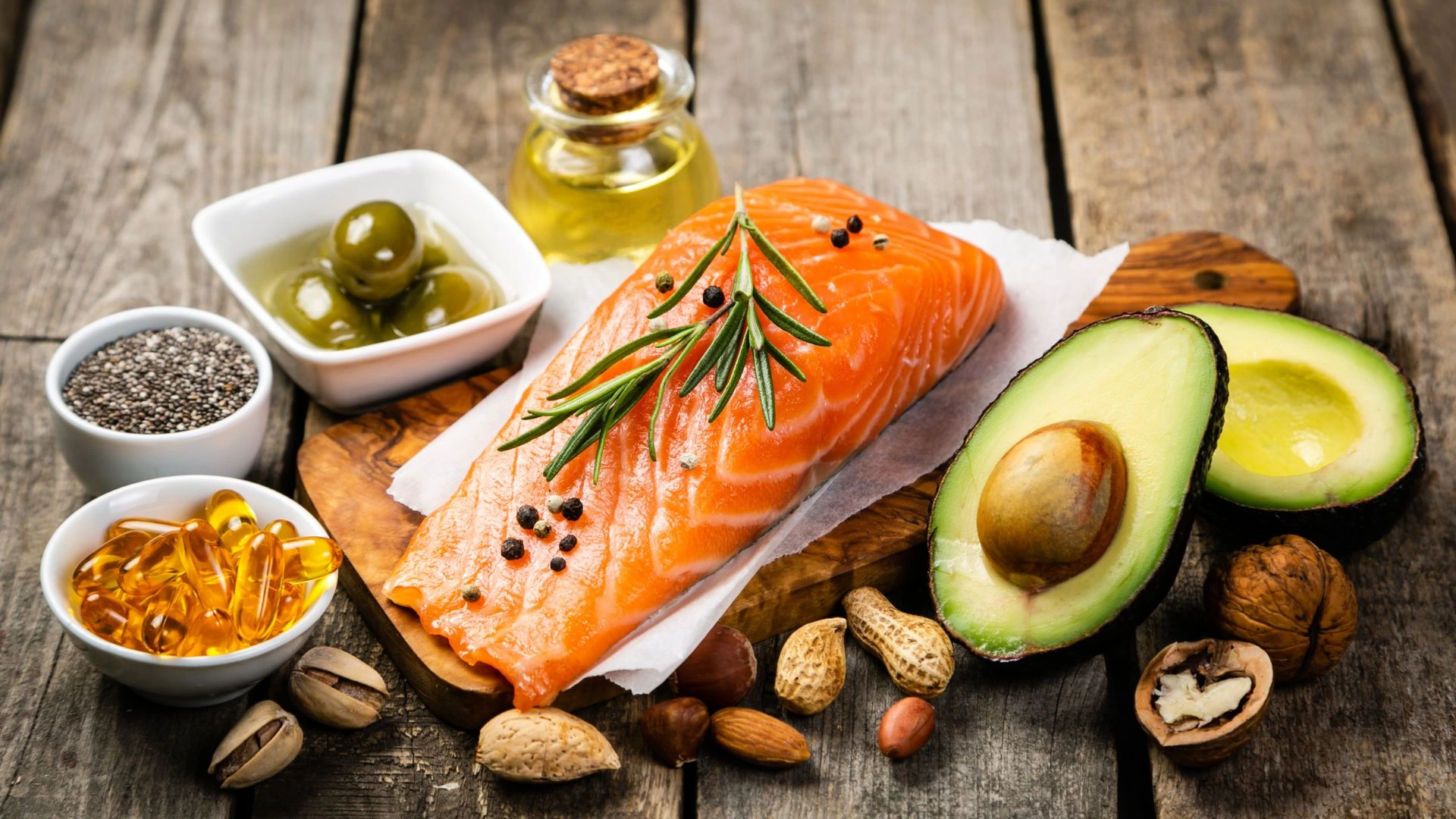
What are Food Requirements for the Elderly?
Do you know what the food requirements for the elderly are? In general, aging is a natural phenomenon that is accompanied by physiological changes in people over time. The process of these changes is the same in different people and is usually the same, but the speed of these changes varies from person to person. In fact, aging is a decrease in mental and physical strength that occurs as a result of the passage of time and is a natural process of time-related changes that begins at birth and continues throughout life.
The elderly are among the vulnerable groups of society who need special care. Taking care of the elderly does not require much knowledge. If those around them, family members and the elderly person know and follow some points, many of the unfortunate events that occur to the elderly can be prevented and conditions can be created for the elderly to feel useful in the family and not consider themselves a burden. This care also includes the nutrition of the elderly and is very important compared to other matters. In this article from humanhealthmag, we will learn more about important points regarding nutritional needs for the elderly.
The Importance of Nutrition in the Elderly
Paying attention to food requirements for the elderly is very important. Aging and senility cause a gradual decrease in physical activity and an increase in chronic diseases. Improving nutrition and care for the elderly can largely prevent or reduce these problems in old age. For this reason, one of the important issues for the elderly is their nutritional status. Elderly caregivers should be familiar with foods for bone health in seniors.

Of course, the type of nutrition is very important in old age, because overweight, high blood pressure, high blood fat and high blood sugar are common problems that proper nutrition helps control. In addition, with age, muscle mass and metabolism in the elderly decrease, food consumption decreases, and changes occur in the elderly’s body that increase the likelihood of malnutrition. As a result, with a healthy diet, the risk of diseases in the elderly can be reduced. For example, high protein soft foods for the elderly can be very useful for this group of people.
Food Requirements for the Elderly
What foods do seniors need the most? Dietary requirements of elderly people change in parallel with weight gain in the elderly. The need for some nutrients may increase in the elderly during this period, while the need for others decreases. nutritional Needs for the Elderly include:
- Energy: Energy needs decrease with age, which is due to less physical activity and decreased muscle mass in old age. If the energy intake exceeds the requirement, problems and complications such as obesity, blood pressure, and cardiovascular diseases arise for the elderly. Caregivers of the elderly should be familiar with vitamins for seniors daily and provide the vitamins needed by these people.
- Protein: Protein needs do not change with age, but are often not met in sufficient quantities in the elderly due to reduced energy intake and changes in taste. Therefore, attention should be paid to providing the appropriate amount of protein needed in the elderly. For example, immune boosting foods for elderly people prevent elderly people from having problems walking and doing daily tasks.
- Carbohydrates: As with all ages, it is recommended for elderly people that carbohydrates constitute more than half of their energy intake. Dietary fiber is recommended in an amount of 20 to 35 grams per day for elderly people.
- Fat: Healthy elderly people can get a maximum of 30 percent of their daily calories from fat. The amount of saturated fats should not constitute more than 8 to 10 percent of daily energy in elderly people. The amount of cholesterol intake of elderly people should be controlled so that they do not consume too much.
The Amount of Fluids Required by the Elderly
An important issue in food requirements for the elderly is getting enough fluids. In old age, three major changes increase the likelihood of dehydration, including a decrease in body water volume, a decrease in the ability of the kidneys to concentrate urine, and a decrease in the feeling of thirst.
Dehydration in many elderly people may cause symptoms such as dry lips, sunken eyes, fever, constipation, decreased urine volume, and nausea, so adequate water and fluid intake is especially important in old age. An elderly person should drink at least six to eight glasses of fluids, preferably plain water, daily to prevent dehydration.
Nutritional Problems in the Elderly
Problems that affect the food requirements for the elderly are classified into three main categories. This problems include mental and psychological problems in the elderly, problems related to living conditions and physical problems in the elderly. An elderly person who lives alone may not know how to cook or may not be able to do this. In this case, it is better to get a caregiver or nurse for him so that there is no problem. This nurse should know how many calories does an elderly bedridden person need? In that case, he can take better care of the elderly’s nutrition.
Usually, due to aging or due to the occurrence of some diseases, the ability to move physically decreases in the elderly. In such circumstances, trying to prepare food may become a difficult task, in which case we can get a caregiver or nurse for them so that the elderly do not get sick due to lack of movement. Along with the changes caused by aging, the body’s metabolism decreases for every year after the age of 40. For this reason, if the elderly continue to eat the same amount of food as they did before they were old and in their youth, they will gain weight. Decreased physical activity exacerbates this weight gain.

Due to changes in the digestive system, stomach acid secretion often decreases. Decreased stomach acid makes it difficult for the elderly to digest and absorb some important vitamins and minerals, and your elderly person may develop a deficiency. Vitamins such as vitamin B6, B12, and folic acid are from this group. These vitamins play a fundamental role in providing energy and maintaining mental alertness, ensuring the health of the circulatory system, and strengthening the elderly’s memory.
Best Food Requirements for the Elderly
Best dietary requirements of elderly people Like children’s diets, they should include all the major food groups and help meet their daily needs for vitamins and minerals. The elderly diet should be such that it prevents chronic diseases such as diabetes, heart disease and blood pressure. A balanced diet is quite suitable. Some important principles in regulating the diet of the elderly are:
- Dietary variety: Food for the elderly should be varied and include fruits, vegetables, whole grains, low-fat proteins and low-fat dairy products.
- Reduce salt and sugar intake: Salt and sugar intake should be reduced to a minimum to prevent increased blood pressure and the risk of diabetes.
- Increase fiber intake: Dietary fibers help improve digestive function and prevent constipation. The consumption of fruits, vegetables and whole grains should be increased for nutrition in the elderly.
- Adequate protein intake: Proteins are essential for maintaining and strengthening muscles. Low-fat protein sources such as chicken, fish, eggs, and low-fat dairy are recommended.
- Drink plenty of water: Seniors should drink plenty of water daily to prevent dehydration. Drinking water, herbal teas, and low-salt soups can be helpful.
Foods Rich in Omega-3 Fatty Acids
These fatty acids are important for people of all ages, including the elderly, because they prevent inflammation that can cause cancer, rheumatoid arthritis, and heart disease. Omega-3s have also been shown to slow the progression of vision loss. Recent evidence has shown that these fatty acids can reduce the risk of Alzheimer’s disease and keep the brain sharp.
Omega-3s are found in sardines, tuna, and salmon, flaxseed, soybeans, canola oil, and walnuts. Nutritionists recommend consuming omega-3 fatty acids twice a week. Omega-3 supplements can also be helpful, but be sure to consult your doctor before starting.

Calcium-Rich Foods
Calcium helps our body keep our bones healthy. Test results have also shown that calcium lowers blood pressure. Unfortunately, studies have shown that as we age, we consume less calcium. The body’s need for calcium is so urgent that if we don’t get enough, it starts to be reabsorbed from the bones. Calcium deficiency in elderly makes your bones brittle and leads to osteoporosis.
Foods rich in calcium are mainly dairy products such as milk, yogurt and cheese, as well as green vegetables and calcium-fortified cereals. The World Health Organization recommends that people over the age of 50 consume 1,200 milligrams of calcium per day. Some people find it difficult to absorb the daily amount of calcium through their diet, in which case they can follow their doctor’s instructions for taking supplements.
Foods Rich in Fiber
As we age, our digestive system slows down. The walls of the digestive tract thicken and contractions become slower and less frequent, which can lead to constipation. Foods rich in fiber help the digestive tract to move properly. Fiber has also been shown to reduce the risk of heart disease. Fiber-rich foods include nuts, whole grains, whole-grain bread and pasta, brown rice, brown bread, fruits, and vegetables.
Iron-Rich Foods
Iron plays a vital role in the body. It produces hemoglobin, which carries oxygen in the blood from the lungs to the rest of the body. When you don’t consume enough iron, it leads to feeling tired and lethargic. Iron deficiency leads to anemia.
Foods Rich in Vitamin C
Vitamin C has antioxidant properties that can prevent cancer and heart disease. It also plays a role in the production of collagen, which gives your skin elasticity and removes dead skin cells, giving you healthy skin. Vitamin C helps repair bones, teeth, and heal wounds. This essential vitamin can be found in fruits and vegetables.
Vitamin D
Vitamin D helps the body absorb calcium and slows down the rate at which calcium is lost from bones. This helps maintain bone density and prevents osteoporosis. Vitamin D is produced when the skin is exposed to sunlight.
Naturally, vitamin D is found in eggs and certain fish (salmon and tuna), some foods such as cereals, milk and yogurt. Some believe that exposure to sunlight makes us more susceptible to skin cancer, so it is recommended to use vitamin D supplements in consultation with a doctor instead of direct exposure to the sun.

List Of Food Requirements for the Elderly
The food list for the elderly should include a variety of foods that are rich in nutrients. Some of the food requirements for the elderly that do not cause excessive obesity in the elderly include:
- Fresh fruits and vegetables: This food group is rich in vitamins, minerals and dietary fiber and helps improve the overall health of the body.
- Whole grains: Whole grain breads, oatmeal and brown rice are good sources of fiber and B vitamins.
- Low-fat proteins: Skinless chicken, fish, eggs and low-fat dairy products are excellent sources of protein.
- Low-fat dairy products: Yogurt, milk and low-fat cheese are good sources of calcium and vitamin D, which help maintain bone health.
- Nuts and seeds: Consuming small amounts of nuts and seeds can help provide healthy fats and protein.
Concluding Remarks
In this article, we talked about food requirements for the elderly. In general, nutrition for the elderly plays a vital role in maintaining health and quality of life and improving body weakness in the elderly. By following a balanced diet and choosing healthy foods, the elderly can prevent many chronic diseases and improve their general health. Also, paying attention to the specific needs of each individual and consulting with a nutritionist can help to set up a proper diet.
Paying attention to the nutrition of the elderly and preventing malnutrition in adults not only helps their physical health, but can also have a positive impact on their mental health and quality of life. We hope that by providing this information, we can help improve the nutrition of the elderly and increase awareness in this field.
Could you help us make this content even better? What do you love, and what can we improve? Share your thoughts below, feedback is the key to creating better content for YOU. If you also have an experience in this regard, please share it with us and others.

Frequently Asked Questions
What Foods are Harmful to the Elderly?
Some foods are harmful to the elderly and cause overeating in the elderly. And they should be avoided:
- High-fat and fried foods: These foods contain unhealthy fats and high calories that can lead to weight gain and heart disease.
- High-salt foods: High salt intake can lead to high blood pressure and kidney problems.
- Sugar and sweets: High sugar intake can increase the risk of diabetes and heart disease.
- Processed foods: These foods are usually high in salt, sugar, and unhealthy fats, and their excessive consumption can lead to serious health problems.
What Foods are Rich in Magnesium?
Magnesium plays an important role in over 300 physiological functions in the body. It keeps your heart healthy and your immune system and bones strong. As you age, your body’s ability to absorb magnesium decreases. Some medications for older adults also reduce magnesium absorption. Magnesium is found mainly in whole grains, nuts, fresh fruits, and vegetables.
